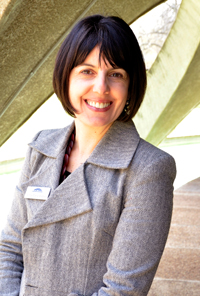
.jpg)
This year, the theme for International Women’s Day is Changing Climates: Equality today for a sustainable tomorrow, which recognises the contributions of women and girls around the world, and calls for climate action for women, by women.
The Academy’s Diversity and Inclusion Strategic Lead, Allison Hornery, took the opportunity to speak with Professor Sue O’Reilly, Chair of the Academy’s Equity and Diversity Reference Group, and the Academy’s Chief Executive, Ms Anna-Maria Arabia, to explore how we might all help to change the climate of gender equality.
Reflecting on how far we have come in achieving gender equity at an institutional level, Professor Sue O’Reilly acknowledges the increase in the number of women in senior positions and how initiatives such as SAGE have played a vital role in changing the narrative around gender equity, including raising awareness and encouraging organisations to develop strategies and policies that address the issue of inequity.
“We've come a very long way on that journey. There's a long way still to go,” Professor O’Reilly said.
She also reflected on her own journey and experiences and how it has made her a strong advocate for women’s rights.
“The headmaster, who had a son in my class, looked down at me very condescendingly, and said, ‘Ah, girls don't need physics. Girls get married, and their husbands look after them’. So, my friend and I set up on the veranda for two years, working from the syllabus, working from textbooks, and then we beat all the boys in the actual final exam. It was a wakeup call to me; I think it made me a little bit feisty about advocating for women's rights.”
The headmaster, who had a son in my class, looked down at me very condescendingly, and said, "Ah, girls don't need physics. Girls get married, and their husbands look after them". So, my friend and I set up on the veranda for two years, working from the syllabus, working from textbooks, and then we beat all the boys in the actual final exam. It was a wakeup call to me; I think it made me a little bit feisty about advocating for women's rights.
The COVID-19 pandemic has had a severe impact on individuals and institutions; and has shed a light on the realities of what it is like to be a woman in STEM and the existing institutional and cultural barriers that continue to put women at a disadvantage.
“It was women who predominately took on a greater proportion of the domestic responsibility when working from home … making it particularly difficult to advance their research even when it was possible to continue research outside of a formal scientific setting,” Ms Arabia said.
Employers and organisations have had to develop flexible work arrangements which better supported individuals, and with this it has become clear that such policies can create sustainable and inclusive working environment that produce better work outcomes.
“We know diversity results in better decision making, greater profits, greater productivity and higher quality publications. With that comes more competitive research grants so there are a range of benefits in the STEM sector,” she said.
We know diversity results in better decision making, greater profits, greater productivity and higher quality publications. With that comes more competitive research grants so there are a range of benefits in the STEM sector.

In order for us to achieve gender equity, it is vital that long-term and sustainable changes are implemented across the STEM sector which is why initiatives such as STEM Women and the Decadal Plan for Women in STEM have been instrumental.
“The Decadal Plan Champions program offers institutions, organisations, entities, private businesses – wherever you may sit in the STEM ecosystem – an opportunity to align your work to achieve gender equity, with the recommendations in the Decadal Plan for Women in STEM,” Ms Arabia said.
On this International Women’s Day, and every day moving forward, it is important that we continue to discuss ways we can and do advance gender equity and ensure we do so in an inclusive and intersectional manner to ensure the impacts of inequitable practice on diverse groups are considered.
“I'm really pleased that there is growing awareness, there are proactive initiatives, and part of the discussion has really matured, around how we look at Indigenous knowledge, how we bring more Indigenous scientists closer to the Academy’s work, and how we work together to design a path forward,” she said.
I'm really pleased that there is growing awareness, there are proactive initiatives, and part of the discussion has really matured, around how we look at Indigenous knowledge, how we bring more Indigenous scientists closer to the Academy’s work, and how we work together to design a path forward.
See the full transcript and recording of the interviews on the STEM Women website.
Visit the Academy’s Climate Change Hub and Future Earth Australia for more information on how the Academy is contributing to address climate change.

© 2025 Australian Academy of Science